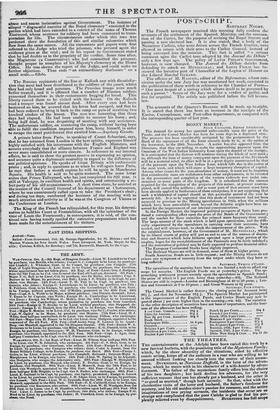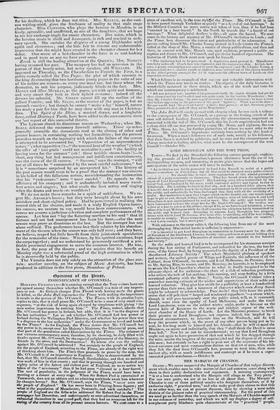THE THEATRES.
THE entertainments at the Adelphi have been varied this week by a new farcical burletta, with the promising title of the Mysterious Family; which, by the sheer absurdity of the situations, aided by effective comic acting, keeps all of the audience in a roar who are willing to be amused without looking too closely into the source of their amuse- ment. BUCKSTONE, as Narcissus Daffodil, is the hero of the adven- tures, which he meets with in his character of a wife-hunter by adver- tisement. The father of the mysterious family offers him the choice of his two daughters; but both decline his advances, for the very sufficient reasons that one has already got a husband, and the other is "as good as married," though both secretly. So that, what with the clandestine visits of the lover and husband, the father's fondness for mystery, and his old maiden sister's passion for romance, and the active imaginations of two prying servants, the incidents that occur are so strange and complicated that the poor Caelebs is glad to find his per- plexity relieved even by disappointment. BUCKSTONE has full scope
for his drollery, which he does not stint. Mrs. Ki.1.1.1:y, as the curi- ous waiting-maid, gives the freshness of reality to that stale stage character. Miss Ct.treonu, who plays the heroine in Mandrin, is so lively, agreeable, and unaffected, as one of the daughters, that we hope to see her exchange tragic for comic characters. Her voice, which in the heroine strain is shrill and larmoyante, is rich and musical in ordi- nary speech. She sustains the disguise of a young Highlander with spirit and cleverness ; and she bids fair to reverse any unfavourable impression that she might have created in the character chosen for ht debut. One scene of a bed-chamber in the farce is as real-looking and in good taste as any we have ever seen.
Zarah is still the leading attraction at the Queen's ; Mrs. NISBETT having resumed her part. The company has had an accession in the
person of that hearty actor, but noisy speaker, old Wit.usAsts. He appeared on Thursday, as the Chamberlain to Francis the First, in a petite comedy called the Two Pages ; the plot of which consists in the king discovering that two handsome young pages in the suite of one of his nobles are women—as every one must see, but those whom the
dramatist, to suit his purpose, judiciously blinds to the fact. Mrs. flosev and Miss MURRAY, as the pages, net with spirit and humour ; and very smart they look in their hybrid costume : indeed all the dresses are splendid. Arr. GREEN cannot fill up the outline of the gallant Francis ; and Mr. SELBY, as the master of the pages, is but an uncouth courtier ; but though he cannot " make a leg" himself, nature has made a pair for him that he may show with any man in Christen- dom. The Spirit of the Rhine, a musical drama, and a laughable farce, called Hunting a Turtle, have been added to the amusements since our !ast report of this successful theatre. The Lyceum closed its disastrous season on Wednesday ; when Mr. SERLE delivered the customary farewell address. These apt Mies generally tesemble the documents read at the closing of other and greater houses, in containing nothing but formalities ; but the present provokes remark on the ingenuity with which the failure of the season is attempted to be accounted for. " Opposition of an unprecedented nature " (what opposition ?)—" the unusual beat of the weather" (which the offer of ices gratis' could not neutrulize)—und " the facility of leaving town for the summer" (oh ! these terrible steam-boats !)—in short, any thing but bad management and indifferent entertainments, was the cause of the ill success. " Success," says the manager, "will not at all times be " commanded by the most careful endeavours," but it is " sometimes surprised by an unexpected hit." The history of the past season would seem to be a proof that the manager was sincere in his belief of this fallacious notion, notwithstanding the insinnation that his "endeavours" were " most careful." He appeals to the efficiency of his company ; and it undoubtedly included many excel- lent actors and singers ; but what avails the best acting and singing when the drama and music ere worthless?
We do not make these remarks in a spirit of unkindness. We re- gret Mr. ARNOLD'S losses ; but they were brought about by his own mistaken and short-sighted policy. Had he persevered its realizing the second title of his theatre, and made it a truly English Opera-house, his success, we venture to say, would have been commensurate. Of course we assume a judicious selection and complete performance of the operas. Let him not "lay the flattering unction to his soul" that ill fortune and not bad management has been his bane,—else the next season may prove as disastrous as the last. But the manager has not alone suffered. The performers have lost their salaries by his abandon- ment of the theatre when the season was only half over ; and they have, we believe, reaped but little benefit from their joint-stock speculation for the remainder of the time. WILSON, by his spirited exertions, kept the corps together ; and we understand he generously sacrificed a pro- fitable provincial engagement to serve the common interest. He was, in fact, the prop of the theatre ; and we rejoice that his benefit on Monday night was a substantial proof of the high estimation in which he is deservedly held by the public.
The Victoria does not rely solely on the attraction of the glass cur- tain: another novelty, on the subject of Marie Antoinette, has been produced in addition to the first piece, Stanislaus of Poland.



























 Previous page
Previous page